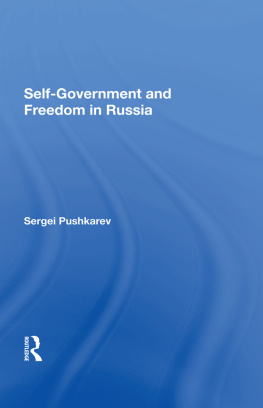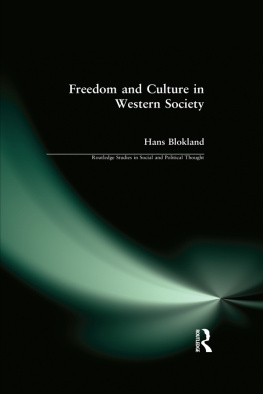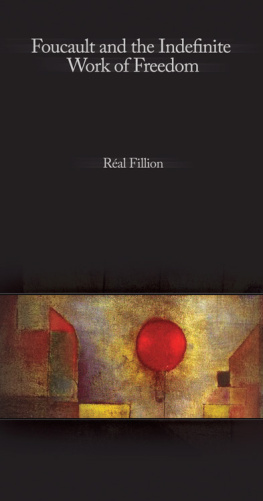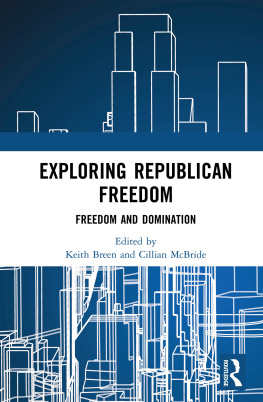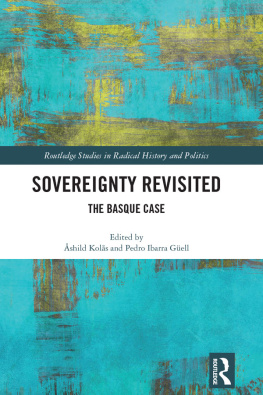FOUCAULT, FREEDOM AND SOVEREIGNTY
To Marina and Denis
Foucault, Freedom and Sovereignty
SERGEI PROZOROV
Petrozavodsk State University, Russia
ASHGATE
Sergei Prozorov 2007
All rights reserved. No part of this publication may be reproduced, stored in a retrieval system or transmitted in any form or by any means, electronic, mechanical, photocopying, recording or otherwise without the prior permission of the publisher.
Sergei Prozorov has asserted his right under the Copyright, Designs and Patents Act, 1988, to be identified as the author of this work.
Published by
Ashgate Publishing Limited
Gower House
Croft Road
Aldershot
Hampshire GU11 3HR
England
Ashgate Publishing Company
Suite 420
101 Cherry Street
Burlington, VT 05401-4405
USA
Ashgate website: http://www.ashgate.com
British Library Cataloguing in Publication Data
Prozorov, Sergei
Foucault, freedom and sovereignty
1. Foucault, Michel, 1926-1984 - Political and social views
2. Liberty 3. Sovereignty
I. Title
320'.011
ISBN: 978-0-7546-4908-3
ISBN: 978-1-4094-9585-7 (ebk-ePUB)
Library of Congress Cataloging-in-Publication Data
Prozorov, Sergei.
Foucault, freedom and sovereignty / by Sergei Prozorov.
p. cm.
Includes index.
ISBN-13: 978-0-7546-4908-3
1. Liberty. 2. Sovereignty. 3. Foucault, Michel, 1926-1984. I. Title.
JC571.P795 2007
320.01'1--dc22
2006033051
Printed and bound in Great Britain by TJ International Ltd, Padstow, Cornwall.
Contents
Preface
This book was born out of a simple thought experiment. How can we define freedom? While political philosophy has offered us an impressive array of such definitions over millennia, it quickly becomes apparent that any positive definition of freedom demonstrates its own insufficiency at the very moment of its enunciation. The very act of predicating certain qualities and attributes to the subject of freedom logically invites the question of whether this subject must not retain the capacity to become free from these very qualities and attributes to remain genuinely free. As soon as we triumphantly conclude, on the basis of studious research or a spark of creative genius, that freedom is this or that, this very conclusion instantaneously calls forth the spectre of another freedom, a freedom from the very this or that that we so arduously tried to posit as its essence. Perhaps, freedom is nothing but this spectre itself, which keeps rupturing our most rigorous definitions, ensuring that the question of freedom remains a philosophical problem that must prohibit its own solution. If political philosophy recurrently manages to awaken from the dogmatic slumber that it so keenly falls into, this is probably because the spectre of freedom continues to haunt its discourse, simultaneously marking its radical insufficiency and rendering impossible any attempt at its successful completion. Thus, to remain faithful to its own spectre, freedom must always be thought as both absolute and undefinable, absolutely undefinable in positive terms.
The same spectre of non-positive freedom arguably haunts contemporary world politics. On the one hand, the affirmation of freedom must characterise any politics, worthy of the name, to prevent its degeneration into technocratic administration. On the other hand, in contemporary politics freedom has become an incontestable and hence vacuous slogan, at best reducing freedom to its particular positive definition and at worst legitimising the very opposite of what it affirms. One of the motivations for this book is the sense of disappointment in the promise of liberation in the aftermath of the demise of Soviet socialism, which, we must recall, was itself advanced as a global project of emancipation. This disappointment has little to do with the widely perceived failure of whatever is meant by democratic reforms in post-Soviet states, but rather results from the way the very affirmation of freedom by post-Soviet democratic authorities has, from the outset, functioned as an instrument of political struggle and the intimidation of the opposition. The passion for freedom that animated anti-communist resistance all too quickly became appropriated as a positive foundation for the new regimes, once again summoning the spectre of freedom, this time as a freedom from the self-proclaimed free societies. Perhaps, the experience of postcommunism demonstrates most starkly the impossibility of securing or guaranteeing freedom by designing a perfect political order, in which everyones desire for freedom would be satisfied. This impossibility makes our thought experiment more than an amusing logical conundrum and redirects our thinking of freedom away from utopian visions and abstract speculations towards what appears to be the most pressing political question: what are the possibilities of freedom that remain available to us irrespectively of the institutional structures of government that either claim to promote it or may be suspected of its suppression? In other words, is there a freedom that cannot be appropriated by any form of political order, however freedom-friendly, and thus remains irreducibly ours?
To answer this question affirmatively, this book undertakes a heterodox reading of Michel Foucaults political thought, claiming that it is precisely because of Foucaults famous scepticism towards all grand narratives of emancipation that his work is exemplary as an affirmation of freedom that goes beyond its attribution to a certain perfect order. While Foucault has on countless occasions been criticised for rendering genuine emancipation impossible, this book argues that Foucaults historical ontologies of power, knowledge and ethics derive both their remarkable force and their intelligibility from the ontological affirmation of freedom that is utterly heterogeneous to any form of political order, any positive knowledge and any moral code. Through the reconstruction of what we shall call an austere ontology of freedom in Foucaults work, we shall reconsider the relation of Foucaults critical project to the proverbial figure of the sovereign subject, which functions as a favourite straw figure in much of contemporary critical thought. Famously decentred from its foundational position in modern metaphysics, this figure stages a comeback in this book, stopping short of reclaiming its central position but rather reasserting itself at the limit of every political order as a paradigm of the subject of freedom, a being that is irreducible to any positive identity but is rather always beside itself with the desire to transgress the limits of this identity.
On the basis of this reaffirmation of sovereignty, this book engages critically with two of the most influential readings of Foucault in contemporary political thought. Contrary to conventional readings, we shall propose that Giorgio Agambens seminal theses on sovereign power and bare life do not imply a wholesale dispensation with sovereignty but rather its reappropriation by the subject of bare life itself in the confrontation with the positive rationalities of government. Secondly, in a critical reading of Michael Hardt and Antonio Negris design for the global democratic project of the multitude, we argue that its fixation on sovereignty as a target of resistance paradoxically leads their project to the replication of the features of the very Empire it seeks to resist. Instead, proceeding from the Foucauldian critique of biopolitical rationalities of government, we shall offer an alternative pathway of resistance to contemporary global governance that consists in the refusal of the biopolitical investment of our existence and seeks to reduce all power to its purely formal structure of sovereignty. In this manner, practices of resistance do not lead to our empowerment as newly emancipated subjects, but rather to our symbolic destitution as subjects of the positive order that we inhabit, which simultaneously enhances our potentiality for being otherwise, which is the closest this book shall get to a definition of freedom.
Next page

